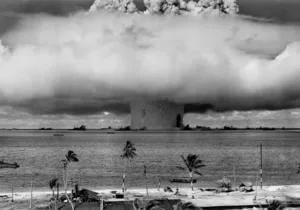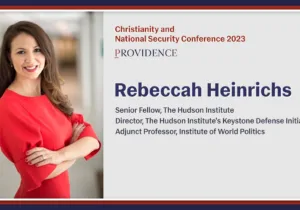The ultimate responsibility anyone could have, from a pauper to the President, is the preservation and protection of humankind; something that should be felt in every heart and mind. Yet we know that, for as surely as this sentiment reflects reality, the preservation of humanity is not something anyone actively thinks about. Most do not lose sleep over nuclear weaponry, but we are very naïve to presuppose that these weapons will indefinitely slumber in their silos. In failing to consider the best options for our nuclear safety, we may fail altogether. So what is the best policy towards our nuclear arsenals? Increase or improve them? Get rid of them as Christian Pacifists might argue? Briefly, let us summarize these options, which will lead us to our answer.
“Uninvention” is not an Option
The first thing to remember is that technology, once known, cannot become unknown. A new technology, whether an LED lightbulb or a bomb, stays in the human toolset, almost like a new organ or appendage that has been evolved. As long as there is dedication to education and technology, these inventions will not go away, as terrifying or as transforming as they may be. The best option then must be for the responsible maintenance and use of all human technologies.
Consider the hammer, for example. As a handy invention, it has been with humanity for thousands of years. Benevolently it is used for carpentry; malevolently it is used for vandalism or even worse, deadly assault. The hammer will never go away, nor will the idea for the gun. It has been created, and technically it expands human power. Like the gun, however, every person who owns one must use it sensibly. Nuclear weapons are but the latest, most dreadful technologies, but they will not go away. Their power does not introduce any new situation, but exacerbates an old one, as both Einstein and Gandhi realized.
Einstein said of nuclear weapons that “The release of atomic energy has not created a new problem. It has merely made more urgent the necessity of solving the existing one.” He referred, succinctly, to the inevitability of wars. He fully appreciated the danger of nukes, quipping “I do not know how the Third World War Will be fought, but I can tell you what they will used in the Fourth – rocks.” Leo Szilard had first discussed with Einstein the potential nuclear chain reaction, which later Oppenheimer produced. After the detonation of the first atomic weapons, Mohandas Gandhi reacted, writing: “I did not move a muscle, when I first heard that an atom bomb had wiped out Hiroshima. On the contrary, I said to myself, ‘Unless now the world adopts nonviolence, it will spell certain suicide for mankind.”
The pacifism and non-violence of Gandhi and Einstein is commendable. We should truly be inspired to protect and preserve our species, as it is indeed the ultimate imperative, but we must ask if these men can provide the best nuclear policies. Surely, they understood the technology would not go away, but it seems they were inclined to join some Christian Pacifists to insist that somehow it can be eradicated. Can this be done? Or must we simply set our minds on the responsible maintenance of the technology? The latter is wisest but let us not dismiss the pacifist without meeting their arguments squarely.
Pacifist Disarmament is not the Best Option
MAD, or “mutually assured destruction,” has been the policy of nuclear deterrent for decades. If we possess sufficient nuclear weapons to existentially threaten Russia, and they pose an equal threat to us, there is a total disinclination to use them. And in this sense peace is preserved with this dreadful threat. Yet war persists and will unfortunately persist for as long as we cannot prevent it. Just War has its roots in the reality of human sinfulness. Certainly, everyone might wish that the nuclear umbrella, which protects as well as threatens, might not exist, but it seems it must.
A pacifist might argue that, since nuclear weapons cannot really ever be used, as they trigger the unthinkable sin of mass annihilation (against the ultimate imperative), their possession is rendered senseless and immoral. One cannot use them, one should not use them, so why even bother having them? Therefore, we must simply make an international accord to eradicate global nuclear stockpiles once and for all, and breathe more easily in a nuclear-free world. Yet there is nothing “simple” about international accords like this being realized, and this thinking persists in the mistaken idea that disposing of a thing is the equivalent to “dis-inventing” it. I can throw all the hammers in my garage away tomorrow, but the hammer will continue to exist.
In my first book, Gandhi and Bin Laden, I wrote “The crisis of our times is that the tools of WMD that we have invented … may well be seized and used against us if we do not understand how to (A) keep them secure in safe hands, and (B) better understand and transform the religious and political climate that either encourages or discourages their use.” That logic still applies. Even if, hypothetically, we could dispose of all the nuclear weapons in the world, someone would then reinvent them. Would that person be morally responsible? Possibly, but very possibly not.
Nuclear weapons in the hands of responsible political powers deter against a deepened climate of war. Nuclear weapons in the hands of a rogue state or terrorist organization would be catastrophe for peace and security. Again, like the hammer, the nuke is not going to go away, we must be sure its technological threat is responsibly maintained. Whether it is a hammer, a gun, or a nuclear weapon, the key idea is that a responsible moral conscience must always be the hand that guides technological use.
Responsible Maintenance
Fortunately, we have had some responsible moral consciences. As Martin Luther King Jr. once said: “Science investigates; religion interprets. Science gives man knowledge which is power; religion gives man wisdom which is control. Science deals mainly with facts; religion deals mainly with values. The two are not rivals. They are complementary.” Science, in this past century, has given us the nuclear weapon, but it is a good religious conscience that must tell us what to do with it. For as long as this technology exists, we must not only maintain it, but more critically foster the moral conscience which keeps it safe. A conscience which harbors a belief in God, in an ultimate responsibility, and a duty to love and protect our neighbors must accompany and check this very dreadful threat. This seems in essence to be “Christian Realism,” to know what our moral duty is, as well as the limits and capacities of our species. A realism that is truly Christian will realize we cannot “uninvent” the technology we possess in one hand but must be guided by the love and wisdom we foster with the other.







 Sponsor a student for Christianity & National Security 2024
Sponsor a student for Christianity & National Security 2024